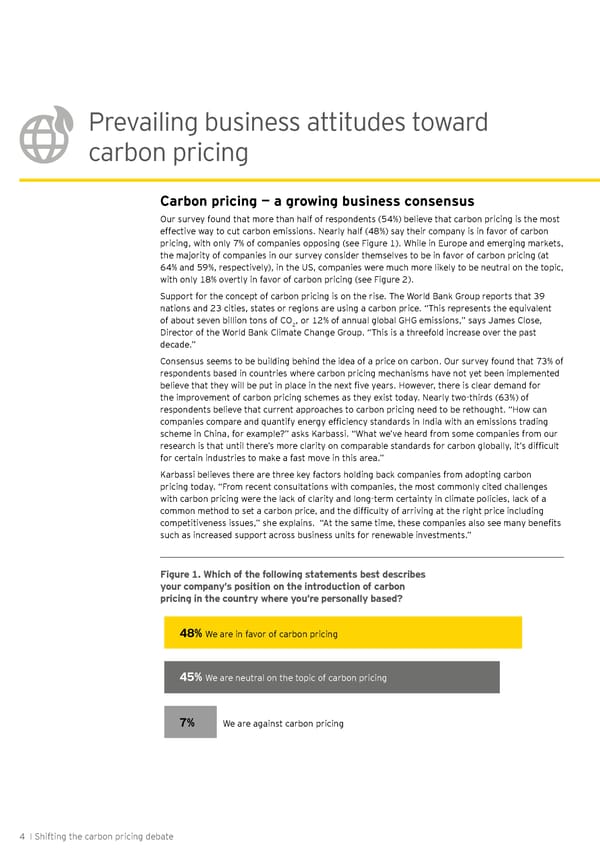Prevailing business attitudes toward carbon pricing Carbon pricing — a growing business consensus Our survey found that more than half of respondents (54%) believe that carbon pricing is the most effective way to cut carbon emissions. Nearly half (48%) say their company is in favor of carbon pricing, with only 7% of companies opposing (see Figure 1). While in Europe and emerging markets, the majority of companies in our survey consider themselves to be in favor of carbon pricing (at 64% and 59%, respectively), in the US, companies were much more likely to be neutral on the topic, with only 18% overtly in favor of carbon pricing (see Figure 2). Support for the concept of carbon pricing is on the rise. The World Bank Group reports that 39 nations and 23 cities, states or regions are using a carbon price. “This represents the equivalent of about seven billion tons of CO , or 12% of annual global GHG emissions,” says James Close, 2 Director of the World Bank Climate Change Group. “This is a threefold increase over the past decade.” Consensus seems to be building behind the idea of a price on carbon. Our survey found that 73% of respondents based in countries where carbon pricing mechanisms have not yet been implemented believe that they will be put in place in the next five years. However, there is clear demand for the improvement of carbon pricing schemes as they exist today. Nearly two-thirds (63%) of respondents believe that current approaches to carbon pricing need to be rethought. “How can companies compare and quantify energy efficiency standards in India with an emissions trading scheme in China, for example?” asks Karbassi. “What we’ve heard from some companies from our research is that until there’s more clarity on comparable standards for carbon globally, it’s difficult for certain industries to make a fast move in this area.” Karbassi believes there are three key factors holding back companies from adopting carbon pricing today. “From recent consultations with companies, the most commonly cited challenges with carbon pricing were the lack of clarity and long-term certainty in climate policies, lack of a common method to set a carbon price, and the difficulty of arriving at the right price including competitiveness issues,” she explains. “At the same time, these companies also see many benefits such as increased support across business units for renewable investments.” Figure 1. Which of the following statements best describes your company’s position on the introduction of carbon pricing in the country where you’re personally based? 48% We are in favor of carbon pricing 45% We are neutral on the topic of carbon pricing 7% We are against carbon pricing 0 10 20 30 40 50 4 I Shifting the carbon pricing debate
 Shifting the Carbon Pricing Debate Page 3 Page 5
Shifting the Carbon Pricing Debate Page 3 Page 5